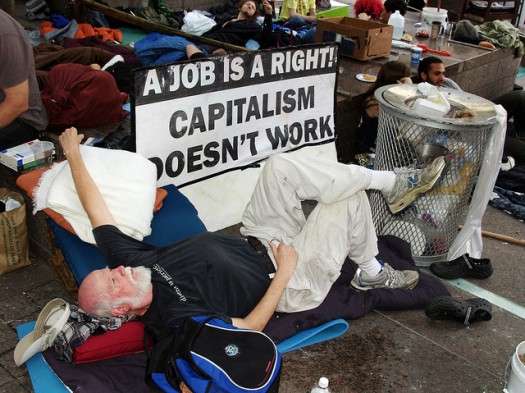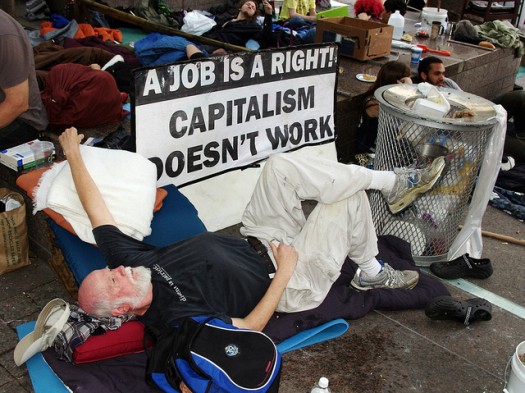By: Renee Nal
New Zeal
An OpEd posted at the Tampa Bay Times by Economics professors William L. Holahan and Charles O. Kroncke (retired) begins with the sentence: “It is a common misconception that entrepreneurs create jobs.” Instead, they argue, taxpayer funded “investments” into education and infrastructure is what empowers the “true job creator: the workings of the market.”
The roads and bridges argument has been used by President Obama in his infamous “You didn’t build that” speech, where he argued that entrepreneurs are powerless without the help of others:
If you were successful, somebody along the line gave you some help. There was a great teacher somewhere in your life. Somebody helped to create this unbelievable American system that we have that allowed you to thrive. Somebody invested in roads and bridges. If you’ve got a business — you didn’t build that. Somebody else made that happen.
He continued to tout the power of the government:
The Internet didn’t get invented on its own. Government research created the Internet so that all the companies could make money off the Internet.
This is a common argument used by advocates of big government and yes, contrary to the Constitution.
The federal government has no business spending money on local roads and schools. At least if one considers the Constitution, which many do not, of course. After a law passed for federal funding to build the Erie Canal, for example, President James Madison said that although the project was needed and valuable, he was “constrained” by the Constitution and he vetoed the bill.
But the canal was still built anyway. How?
…the New York State legislature took the matter into its own hands and approved state funding for the canal in 1816, with tolls to pay back the state treasury for upon completion.
As professor of history at Hillsdale College Burt Folsom observes:
The Constitution does not grant Congress the right to appropriate funds for infrastructure. Therefore, the Founders usually argued that states or private companies should do the work; neither good government nor just results occurred when the people in Georgia could be taxed to pave a road or build a canal in New York.
While speaking of the size of government, James Madison wrote in Federalist 48,
It will not be denied that power is of an encroaching nature and that it ought to be effectually restrained from passing the limits assigned to it.
The authors continue,
The fixation on the ‘job-creator’ myth also distorts recession-fighting measures. For example, cutting business taxes when the problem is inadequate demand will not encourage employers to restore lost jobs or to hire more people.
If the problem is “inadequate demand,” the employers should be a bit more entrepreneurial… or fail. That is the beauty of the free market and why government intervention in industries always (always) fails. If an individual can provide a good or service that fulfills a need, he or she is on the way to job creation despite the federal government, which helps to keep innovators from success with their endless regulations and tax requirements. The government, in other words, only serves as an obstacle to true entrepreneurship.
While testifying that the website for the Affordable Care Act was getting closer to being fully functional, Kathleen Sebelius, former Secretary of the U.S. Department of Health and Human Services (HHS) said something very telling:
While there is more work to be done, the team is operating with velocity and effectiveness that matches high performing private sector organizations.
The private sector simply does it better.
The economists quote Nick Hanauer, billionaire venture capitalist and strong supporter and higher taxes, as saying:
Taxing the rich to make investments in the middle class is the single smartest thing we can do for the middle class, the poor and the rich.
Hanauer loves taxes, as evidenced by this recent tweet:
Saying higher taxes make people work less hard is like saying longer distances make runners work less hard. Nonsense. Life is a tournament
— Nick Hanauer (@NickHanauer) December 24, 2014
Holahan and Kroncke have written several articles previously and co-wrote the book “Economics for Voters.” In September, the dynamic duo also argued for a minimum wage increase, which has been found by numerous studies to have a negative effect on low-skilled workers. As reported at Politifact,
The last three federal minimum wage increases (2007, 2008 and 2009) were followed by significant job losses, but that was all taking place amidst the global financial crisis. [emphasis added]
It is not a stretch to consider that raising the wage is really just a political ploy, consequences be damned. The double bonus for the federal government (with their unpaid interns, exempting themselves from the Fair Labor Standard Act), is that minimum wage increases equate to higher taxes. Big government supporters continually and desperately attempt to justify the value of big government, but continually come up short.
This article has been cross-posted at Broadside News.




















